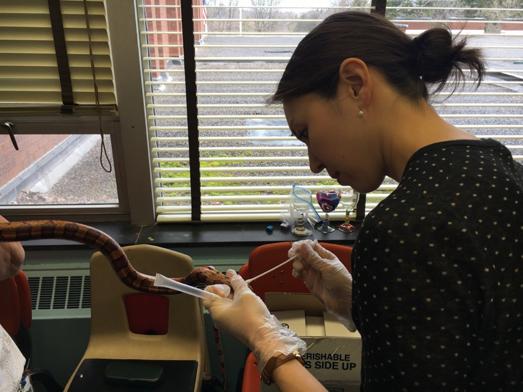-
About
- Leadership & Faculty
- News & Events
-
Admissions
-
Academics
- Graduate
- Advanced Clinical Training
- Continuing Education
- Academic Departments
- Academic Offices
- Simulation Experiences
-
Student Life
- Offices
-
Research
-
Hospitals & Clinics
- Emergency Care
- Hospital Services
-
Community Outreach
- Volunteer
Q&A with IVM Alumni Misha Park Robyn
A conversation with Alumni Misha Park Robyn V09, D.V.M., MPH, DACVPM

Where have you worked since Graduation?
- United States Department of Agriculture, Food Safety & Inspection Service (Supervisory Public Health Veterinarian; Enforcement, Investigation, and Analysis Officer; Frontline Supervisor)
- United Nations Food and Agriculture Organization (International Technical Advisor – Food Safety)
- Centers for Disease Control and Prevention (Epidemic Intelligence Service Officer; Preventive Medicine Fellow)
What is your current position and place of employment?
Preventive Medicine Fellow, Enteric Zoonoses Activity, Outbreak Response and Prevention Branch, Division of Foodborne, Waterborne, and Environmental Diseases, National Center for Emerging, Zoonotic, and Infectious Diseases, Office of Infectious Diseases, Centers for Disease Control and Prevention
How does IVM play a role in your current position?
The experiences and skills I was able to get by doing the IVM program have been invaluable in the work since graduating from veterinary school. Although my current position is focused on prevention of enteric zoonotic disease domestically, so many aspects of what I currently do relate back to skills I learned in the IVM program – this includes conceptualizing and implementing projects from start to finish, understanding government policies and the roles of government veterinarians, industry, non-governmental organizations, and community partners. As well as looking at a health issue and trying to figure out: what can we do about this issue? Who are the players involved? And thinking broadly about this to include the veterinary, human medical, industry, environmental and community viewpoints.
What value have you found in the Post Graduate Certificate in IVM?
I consider the work I did to earn an IVM certificate to be some of the most important learning experiences I had in my life. In completing my IVM certificate, I completed two separate projects: one evaluating the impact of community-based education programs on livestock management and zoonotic diseases in Nepal, and the other on determining the sensitivity and specificity of the Participatory Disease Surveillance method for detection of HPAI in poultry in Indonesia.
These projects gave me experience in working internationally that is helpful to me today. In 2014 and 2015, as an Epidemic Intelligence Service Officer with CDC, I deployed to Liberia for the Ebola outbreak. Because of my previous experience, I think I was able to adapt to the environment quickly; the conditions of the medical facilities and health infrastructure, and the lack of available resources, were not a surprise to me.
From things as small as being able to boil water for drinking and brushing teeth, to cultural competencies of knowing when it is appropriate to barter or not, to professional competency in being able to sit down at the table with other governmental and non-governmental organizations and represent my agency, these were all skills I had developed in the IVM program.
Could you share a memory of your time as an IVM student?
During my Summer Research Project in Nepal, my Nepali veterinary student partner and I spent weeks on a motorbike going from house to house in small rural villages, giving questionnaires on livestock management to the female heads of households. I was struck and humbled by the hospitality and kindness of so many of the families who took the time to answer our questions and often serve us water or hot chai tea. I felt honored to be allowed to have a glimpse into peoples’ lives and make a connection with someone I would not ordinarily meet.
What is your advice for students who are interested in IVM?
Go for it! My summer projects are some of the most fulfilling experiences of my life.